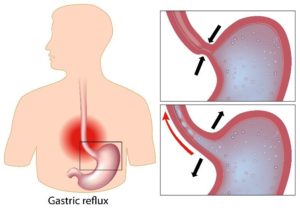Radiofrequency ablation (RFA) is a procedure that utilizes radio waves to destroy diseased tissue. Here’s what you need to know if you are preparing for the procedure.
When it’s used
Radiofrequency ablation can be used during an upper endoscopy to treat Barrett’s esophagus. People with Barrett’s esophagus have an increased risk of esophageal cancer, and RFA can eliminate this risk by destroying pre-cancerous tissue in the esophagus. Patients with both high and low grade dysplasia should almost always pursue radiofrequency ablation. It has an 80-90% success rate in removing Barrett’s esophagus long-term. There is a chance that Barrett’s can develop again after a successful procedure. However, repeat treatments are effective and often able to eliminate abnormal tissues entirely.
Preparing for Radiofrequency Ablation
To prepare for RFA, your physician will discuss preoperative steps with you. First, you will need to talk to them about medications you are taking that could be a risk factor. For example, blood-thinning medications can increase the risk of excessive bleeding during the procedure. Additionally, if you use insulin, you may need to adjust dosage or timing leading up to the RFA. Your doctor will also ask you about any allergies to medications. You will be instructed to stop eating at midnight the day before the procedure.
During the procedure
Before the procedure, you will be on an IV and will give your medical information in a pre-op area. An anaesthesiologist will then discuss sedation for the procedure. Then, you will go to the procedure room. Doctors will connect you to monitors that measure your heart rate, blood pressure, and blood oxygen levels.
Your doctor will perform radiofrequency ablation during an upper endoscopy. You will be on your left side. A bite block will be in your mouth to prevent damage to your teeth or the endoscope. You will be under sedation for the duration of the procedure.
Your doctor will advance the endoscope into your esophagus and examine the Barrett’s esophagus. If they see any visible abnormalities, they may perform an endoscopic mucosal resection. This involves either injecting or banding any identified lesions and then using a snare device to capture, cut, and remove them. If this is not necessary, your doctor will perform RFA. They will inflate a balloon-catheter to make contact with the targeted area and apply heat energy for a second or so.
After the Radiofrequency Ablation
Afterwards, you will wait in a post-op area where you can recover from the sedation while being monitored for any complications. Once you have recovered, your doctor will discuss their findings with you. Some results may take days or weeks to return. They will also give you information on any follow-up appointments.
For the first 24 hours after the procedure, you should not drive or make important decisions due to sedative effects. Your doctor will also recommend a clear liquid diet for a few days following the treatment.
Patients commonly feel some chest discomfort and have difficulty swallowing for a few days after the procedure. Your doctor will be prescribe medications to help with any pain or nausea. You will also need to take a proton pump inhibitor twice a day for 30 days.
Complications
There are a few complications that can occur from the procedure. In around 6% of cases a stricture or narrowing of scar tissue develops in the esophagus. Doctors can treat this with dilation during an upper endoscopy. Another more rare complication is a tear in the esophagus, which occurs less than .02% of the time.
Our experienced team at GHP has years of experience performing radiofrequency ablation. We can help establish the best plan of care for your situation. Contact any of our office locations to learn about the options we offer and schedule an appointment today.



